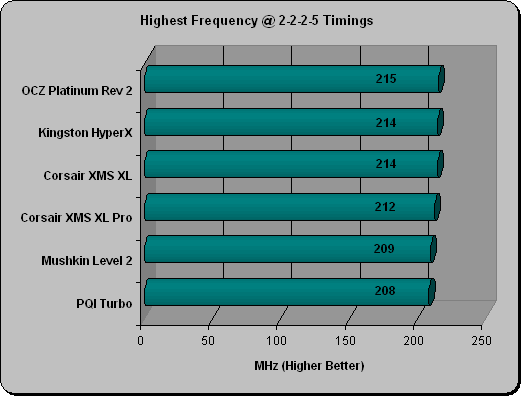Memory PCB Selection Matters
Memory Performance
Our Test System:
- Intel Pentium 4 3.2C 800MHz FSB (Intel ES unlocked Sample)
- Asus P4C800-E Deluxe Canterwood Motherboard
- ASUS 9600 XT Pro 128mb
- Corsair HydroCool 200ex (Water Cooled CPU/Northbridge)
- Seagate 120Gb Serial ATA 150 Hard drive
- Antec True Power 430W Power Supply
- 17″ Sony Trinitron monitor
- Asus BIOS version 1017
Testing Procedure:
All testing was done on a fresh install of Windows XP Professional build 2600 with Service Pack 1A and DirectX 9.0b. All benchmarks were completed on the desktop with no other software programs running. No overclocking was done on the video card unless noted. Our testing processor was an unlocked Intel Pentium 4 3.2C. Our testing was done at:
- DDR 400: 200×16 = 3.2GHz with H/T, Performance Acceleration Mode, and Turbo enabled in BIOS
The audio, USB, Firewire, and LAN features were disabled in the BIOS menu for all the testing completed during this review. All memory was set at the timings noted in the graphs. All testing was completed at 2.85Vdimm unless otherwise noted!
Tight Timing Testing

Results: At tight timings the modules all performed roughly the same no matter what PCB was being used. OCZ and PMI both use the Brain Power PCB’s and are ranked first and last! All the reference PCB’s are right in the middle of the pack. Nothing significant here so lets take a look at some different timings. It also doesn’t look like the modified reference design hurts the Corsair XMS XL module either.
Moderate Timing Testing

Results: At CL2.5 timings we see that all the modules are able to run above 250MHz without throwing any errors during RST Pro2 testing. Note that the OCZ and PQI modules are now both leading the pack by at least 11MHz on the Front Side Bus (FSB) meaning an overall 22-30MHz gain in terms of DDR memory. The OCZ Platinum Revision 2 modules were able to run at DDR550 with aggressive CL2.5 timings. That is a 30MHz Brain Power PCB advantage over the closest reference designed PCB modules.
Loose Timing Testing

Results: Just like the prior graph we see that PQI and OCZ lead the group by a significant difference! The leading Brain Power PCB was 17-21 MHz faster than the other brands using the JEDEC reference design. Would you rather be running DDR564 or DDR522! We are talking about a 42MHz difference in performance from the leading kits from each design. Any overclocker knows that an additional 21MHz FSB and 44MHz on the memory makes a huge performance difference.

Comments are closed.